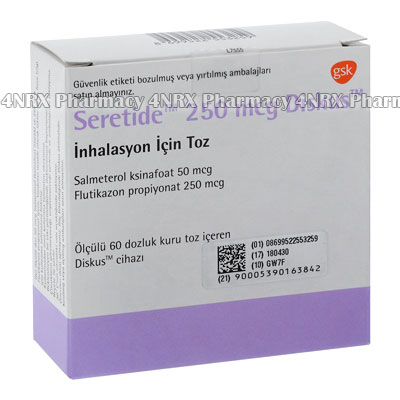 |
Home  Asthma Asthma  Seretide Diskus (Fluticasone Propionate/Salmeterol Xinafoate) Seretide Diskus (Fluticasone Propionate/Salmeterol Xinafoate) |
|
|||||||||
|
|
Seretide Diskus (Fluticasone Propionate/Salmeterol Xinafoate)
What is Seretide Diskus (Fluticasone Propionate/Salmeterol Xinafoate) used for? Seretide (Fluticasone Propionate/Salmeterol Xinafoate) is indicated for the management of symptoms associated with chronic obstructive pulmonary disease (COPD) and asthma. It exhibits anti-inflammatory properties and also relaxes the bronchial smooth muscle. This can help to prevent the occurrence of wheezing, breathing difficulties and asthma attacks. Each of the individual ingredients in this medicine exhibit their therapeutic medicines differently, as both belong to separate classes of medications. How should I use Seretide Diskus (Fluticasone Propionate/Salmeterol Xinafoate)? Refer to the instruction leaflet and the directions given by your doctor in order to ensure that it is used properly. The dosage might differ depending on individual circumstances, such as the condition being treated (asthma may require a different dosage to chronic obstructive pulmonary disease). It is normally used on a daily basis, and your doctor will generally tell you to use the lowest dose which can provide effective control of your symptoms. What are the side effects of Seretide Diskus (Fluticasone Propionate/Salmeterol Xinafoate)? Seretide (Fluticasone Propionate/Salmeterol Xinafoate) could lead to side effects in some patients, which may include:
Make sure that your doctor is made aware of any reactions which occur. It will be necessary to consult your doctor or to visit the hospital straight away if you notice blurry eyesight, sore eyes, fever, more serious breathing problems, sores on the mouth or any other serious symptoms that have not been mentioned here. Please Note Seretide is not for relieving acute symptoms, and your doctor may direct you to keep a fast acting bronchodilator with you in case this occurs. It is possible that serious asthma symptoms may be experienced by patients while using this medicine. See your doctor immediately if this happens. Seek immediate emergency medical attention if you suffer an allergic reaction. Symptoms to watch for, which may be indicative of a reaction, include skin rashes, hives, swelling of the face or limbs, trouble breathing, and trouble swallowing. 
|
||||||||||||||||||